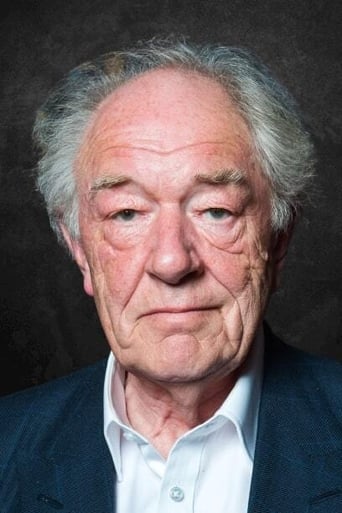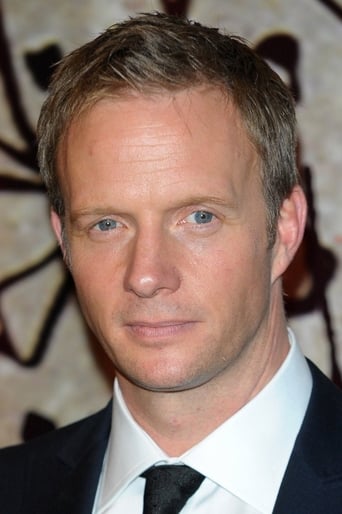Diagonaldi
Very well executed
CrawlerChunky
In truth, there is barely enough story here to make a film.
TaryBiggBall
It was OK. I don't see why everyone loves it so much. It wasn't very smart or deep or well-directed.
Leoni Haney
Yes, absolutely, there is fun to be had, as well as many, many things to go boom, all amid an atmospheric urban jungle.
hoyayer
In "Joe's Palace", the power of Joe's actual palace appears to be supreme and irresistible.Entire lives have been defined for generations according to the social parameters, class distinctions, and boundaries exemplified by this magnificent home. The individual's inability to comprehend the extent to which this mansion exerts its power is the gist of the story.The house can be seen as a surrogate for religion or the monarchy, or the most worshipful possible love for England and its history. The building has a force of personality that cannot be resisted, and everyone whose path crosses it understands perfectly -- even Joe. Ultimately, the house is a monster that seizes control of those who enter. It rips them from themselves and then leaves them diminished or humiliated. Joe fares best, apparently because he sees the hold that the house exerts on people, but himself does not experience it.
Mats
Trademark Poliakoff story that pulls you in; mystery in a languid way. I love several of his earlier BBC dramas. However, after spending 100 minutes watching this film, I must cleanse myself by writing. The author's writing is a bit unfocused and the characters are not very believable, but that is all forgivable. However, when the author wants to tie his yarn together he does not know how. So he uses a tried and tested way; he brings in the Nazis. The archetypal evil can be trusted to do anything strange so that the yarn can be tied up. So utterly pathetic and conventional. And he returns some objects to some Jewish survivor that happens to live in the US (read: HBO Films funded the film). What I hate is how utterly conventional the film becomes in the end. All the mystery in the first 80 minutes evaporates into some politically correct trivial resolution.
AlanJenney
Several years have passed since his father's death and a billionaire (played by Gambon) finds himself stuck, unable to make a decision about what to do with his inherited fortune that he suspects was built on ill-gotten funds. Everything has been put on hold in his life including a house (once the family home), which is still staffed and cleaned despite being largely empty, opposite his place of residence in London.The "Joe" of the title is employed to work as doorman at the vacant house. He mumbles his words and has a vacant look throughout the film. Through his uninspiring diary entries, we listen to the lives of those who come and go.Many of the characters connected to the house are lonely in one way or other: the doorman that Joe replaces; the cabinet minister who brings a mistress to the empty house to "make use of an upstairs room"; the housekeeper and her oppressed staff; the homeless man and the night security guard; Mr. Graham himself. You wish for some drama to happen and although each has their own scene in the sequence of events, nothing of real consequence happens.This depressing atmosphere runs through the entire film. So the one moment of real emotion that occurs is heightened by this empty background.The main plot line is that Elliot Graham recalls moments from his childhood and suspects his father accepted money and gifts from the Nazis. Researchers turn up nothing out of the ordinary in his financial dealings but one of his father's diary entries is discovered by the shop assistant from the local Delicatessen. The diary speaks of his father witnessing the humiliation of Jews whilst arranging a business deal in a park in Germany. Days later, Graham heads off to a castle and Joe tags along. It turns out Graham has gone there to commit suicide. In the only poignant scene of the film, Joe sees a gun in Graham's hand and he rushes him.Strangely, we are then robbed of the chance to see the struggle between man and boy. From this point until the end of the film, things just fall down into sentiment.Much of this film seems then appears unlikely or uninspiring...(a) The politician's mistresses are a long-lasting sub-plot which begs to go somewhere, but instead it fades away.(b) It seems bizarre that the historians and researchers do not turn up anything about the Third Reich business arrangements and it's only the diary entry that says anything about it. The implication is that they are either afraid of Mr. Graham or do not make any connection to what he wants to know.(c) Despite all the other information that comes his way, Joe does not enquire about the only interesting thing that is discovered about Mr. Graham before the suicide attempt. Yet in the closing monologue, Joe professes to have been behind the old man's rehabilitation. Really, he's been a bystander to much of what happened.(d) Elliot Graham comes out of his reclusive state simply by returning the trinkets to relatives of the family they were taken from. This seems to place little consequence on the circumstances in which they were taken and makes his earlier indecision and suicide attempt appear extreme. After all, exactly what he suspected had been uncovered.Disappointingly, it is only Michael Gambon's welcome appearances that hold a lot of this together. Without him, there's barely anything to commend about this story.
paul2001sw-1
Michael Gambon is one of Britain's finest actors, and Stephen Poliakoff one of our more interesting dramatists; but rubbish is rubbish, and sadly, 'Joe's Palace' is not very good. Polliakoff has for a long time been interested in the aesthetics of aristocracy (and concordantly sympathetic to the beautiful), but in this film, he indulges these sentiments in the absence of any meaningful context. A reclusive billionaire does nothing with his life because he is consumed by what he fears his father might have done, although he apparently has no idea what this might have been; several historians fail to discover anything, but the girl from the local deli proves a better researcher than them and discovers that the father had been sympathetic to Nazi values; despite having always assumed that his Dad had been a Nazi collaborator anyway, this persuades the billionaire to think of suicide, although not very hard. Then he gives away a tiny proportion of his wealth (some things his father has stolen) and lives happily every after. Meanwhile, he employs a collection of social misfits (a familiar Poliakoff theme) to staff a huge London house he keeps empty; one of them, Joe, a young man with learning difficulties, is patronised by everyone telling him "what a bright boy" he is and watches silently everything that happens, commenting innanely in his diary but somehow becoming everyone's confident. A slick politician (played by Rupert Penry-Jones, who invests his lines with exaggerated faux-earnestness) and his beautiful mistress (plated by Kelly Reily, who emotes breathlessly but is also unconvincing), also feature for little apparent reason. Meanwhile, everywhere is empty: not just the house, but the streets and parks of London; in every scene, the background is blank, so the Polliakoff can maintain his trademark atmospherics, although you'll never see real life looking like this. The film as whole, meanwhile, is self-important but no less empty, devoid of real meaning and life, with no real dialogue (a scattering of monologues substitute for it) and, criminally for a film starring Gambon, desperately dull.




